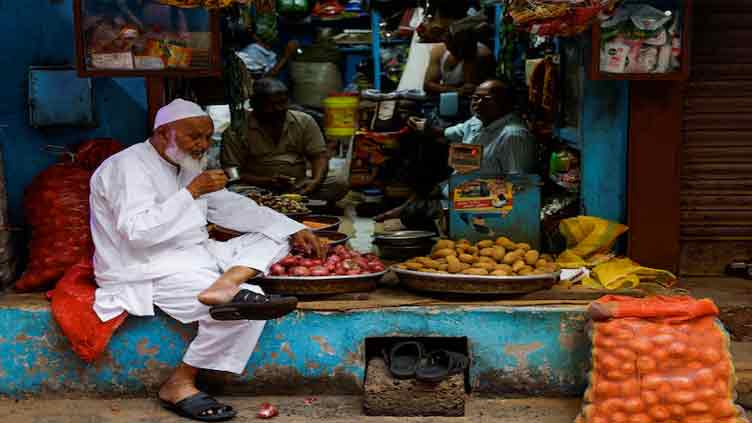Indian wheat stocks at 16-year low, food prices surge

Business
Retail inflation eases slightly in April
- RBI has kept its key interest rate steady for the seventh straight policy meeting last month, as it wants inflation to fall to 4pc on a durable basis before starting the cycletting rates.
NEW DELHI (Reuters) – Wheat stocks in India's government warehouses on May 1 were down 10.3 per cent year-on-year to their lowest since 2008 after two years of low crops prompted the sale of record volumes to boost domestic supplies and lower local prices.
At the start of the month, wheat reserves in state stores totalled 26 million metric tons, down from 29 million metric tons in May 2023, according to the state-run Food Corporation of India.
May wheat inventories are higher than April stocks of 7.5 million metric tons after new season purchases by the Food Corporation of India bumped up reserves.
Higher temperatures clipped output in 2022 and 2023.
Despite the tight supply, New Delhi has resisted calls to encourage wheat imports by cutting or removing the current 40 per cent tax on imports or by buying directly from leading suppliers such as Russia.
Instead, it has dipped into state reserves to sell to bulk consumers, such as flour millers and biscuit makers, to try to curb domestic prices that have been above the state-fixed minimum buying price since the past crop was harvested.
The Food Corporation of India began selling wheat to private players in June 2023 and has so far sold a little more than 10 million tons, a record from state reserves.
India grows only one wheat crop a year, with planting in October and November and harvesting from March. The new season purchases start in April, augmenting state stocks from May.
Although this year's May stocks are lower than last year, inventories are higher than the government buffer and strategic reserve target that requires wheat stocks to be held at or above 7.46 million tons for the quarter beginning April 1.
India failed to achieve its wheat purchase target in 2022 and 2023, followed by a slow start to this year's purchases.
New Delhi banned wheat exports in 2022 despite a rise in export demand as the Russia-Ukraine conflict led to a global shortfall.
INFLATION EASES SLIGHTLY, FOOD PRICES CONTINUE SURGING
India's retail inflation rate eased slightly in April, partly due to lower fuel prices, although food prices remained elevated, government data showed on Monday.
Annual retail inflation in April was 4.83pc, down from 4.85pc in March. Economists polled by Reuters had forecast April retail inflation at 4.80pc.
Food inflation, which accounts for nearly half of the overall consumer price basket, rose 8.70pc in April, compared with an 8.52pc rise in the previous month. Food inflation has been accelerating at more than 8pc year-on-year since November 2023.
The inflation rate for cereals was 8.63pc, compared with 8.37pc in the previous month and pulses rose 16.84pc, compared with 17.71pc in March. Vegetable prices rose 27.8pc in the month of April.
With parts of the country experiencing a heatwave, food prices continue to pose an additional risk to India's inflation trajectory, according to the latest Reserve Bank of India (RBI) bulletin.
"The anticipated threat from a severe heatwave has so far not played out in a disruptive manner, food price pressures need to be on close watch due to their inherent volatility," said Vivek Kumar, economist at QuantEco Research.
In April, fuel and power prices fell 4.24pc compared with a fall of 3.24pc in the previous month.
Core inflation, which strips out volatile food and energy prices, is estimated at 3.23pc in April, compared with 3.3pc-3.4pc in March, according to two economists.
The Indian government does not release core inflation figures.
Even though core inflation has been benign, the RBI kept its key [India] interest rate steady for the seventh straight policy meeting last month, as it wants inflation to fall to 4pc on a durable basis before cutting rates.
"We do not expect much change to RBI's narrative for now as a prolonged pause in policy rates remains the base case," said Upasna Bhardwaj, economist at Kotak Mahindra Bank.
High food inflation and rural stress have been two key policy planks in the ongoing national election for the country's main opposition Congress, which has promised several cash handouts to alleviate the situation.
To contain food inflation, Prime Minister Narendra Modi, who is chasing a rare third term in power, has banned exports of wheat, rice and onions when prices rose to contain domestic inflation.
Earlier this month, India lifted its ban on onion exports ahead of voting in key onion-growing areas.
Last week, government's chief economic advisor V Anantha Nageswaran said he did not see any "nasty" upside at the moment to the inflation and expected it to ease towards 4pc.


